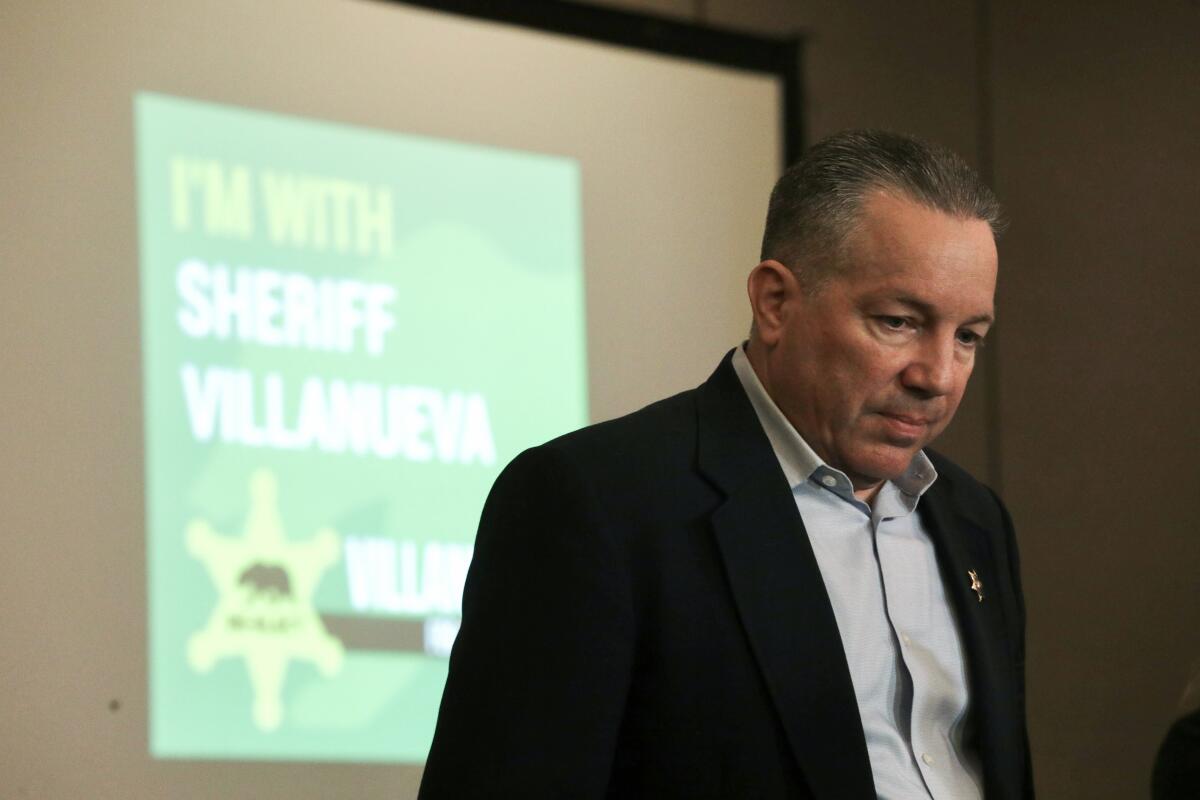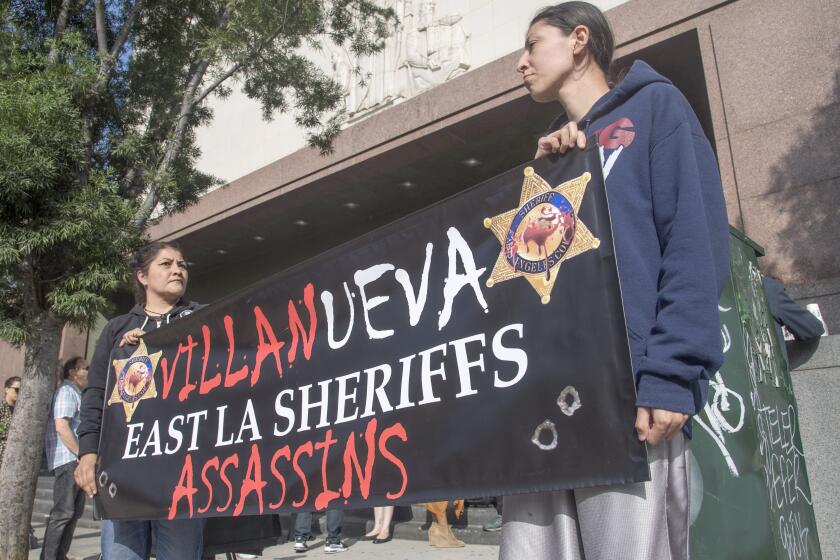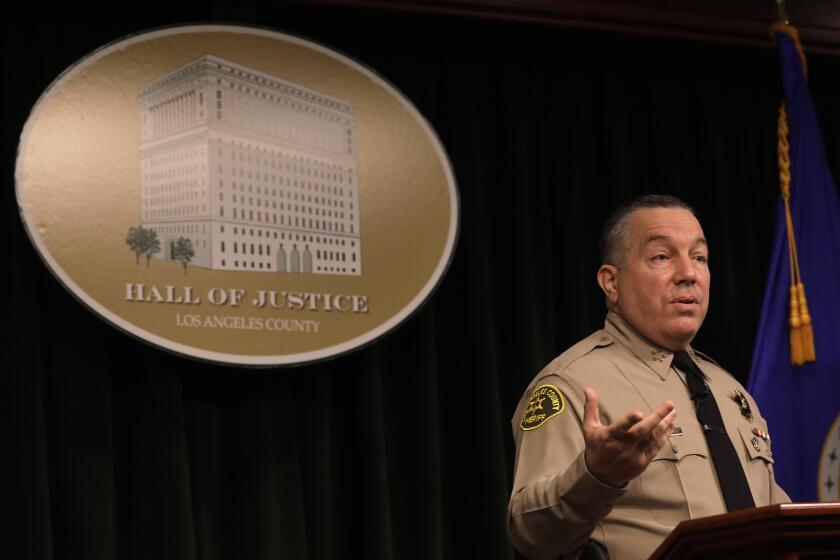Column: If California finally starts cracking down on rogue sheriffs, thank Alex Villanueva

- Share via
Every time we get an update from election officials it becomes clearer just how badly Sheriff Alex Villanueva underestimated the people of Los Angeles County.
People like Helen Jones, a Black woman who grew up over-policed in Watts.
For the record:
9:02 a.m. Nov. 11, 2022Accompanying the photo of former Long Beach Police Chief Robert Luna and his wife, Celines, with supporters, an earlier version of the caption said the picture was from election night. It was from primary election night.
It was back in 2009 that her son, John Horton, died in jail, just weeks after his 22nd birthday. Initially, the Sheriff’s Department called it suicide, saying he had hanged himself. But subsequent medical reports turned up signs of severe physical trauma.
Jones wanted to pursue criminal charges, but filed a wrongful-death lawsuit instead. The county settled in 2016 for $2 million.
“The Sheriff’s Department is, like, really untouchable,” she told me, “and that’s how everybody always feels.”
This is what set Jones on a path to activism. And that activism set her on a path to joining the coalition that went after Villanueva and helped put Measure A, which would give the L.A. County Board of Supervisors the authority to oust an elected sheriff, on this month’s ballot.
“We really need this to pass because, right now, there is no one to really hold the Sheriff’s Department accountable,” Jones said. “And that’s why they’re doing what they do.”
These are the types of comments from the types of people with the types of politics that Villanueva has spent four years in office dismissing with a condescending smirk or snort.
Early results show voters have come out overwhelmingly in favor of Measure A, which gives the L.A. County Board of Supervisors the power to fire an elected sheriff if four out of its five members agree that the person is unfit for office.
Well, now, a whopping 69% of voters across L.A. County — myself included — have backed Measure A. That’s as of Friday, with more than 1.5 million ballots counted. It’s a percentage that has held remarkably steady since election night.
For this, I’m sure Villanueva has already compiled a list of people to blame. Activists such as Jones. Other elected officials, such as Supervisor Holly Mitchell, who was instrumental in persuading her colleagues to put Measure A before voters.
But really, the sheriff should just look in the mirror. Or revisit what he said during a short speech on election night.
“We did things that no one had ever done before,” he told the room of bummed-out supporters, who are probably even more bummed out now. “We spoke truth to power.”
Villanueva has been speaking his truth to power, all right.
To the county supervisors. They control his department’s $3.8-billion budget, but that hasn’t stopped him from hurling insults at them on Facebook or having one served a search warrant, hauling her outside in her bare feet.
To the inspector general, Max Huntsman, whom Villanueva has locked out of the Sheriff’s Department’s offices and computers, effectively preventing the county watchdog from doing his job.
To the Civilian Oversight Commission, one member of which he had investigated on trumped-up — pun intended — charges.
And, of course, to L.A. County Dist. Atty. George Gascón, whose office opened a criminal investigation this week into whether Villanueva violated state law by making a video begging deputies to donate to his reelection campaign.
“It’s up to each and every one of you who you want to be as sheriff,” he implored. “We’re gonna win this thing, and Lord willing, and if you want to help, anything will help us get our message out there, get our ads online and on TV and our texting going on.”
Villanueva has spent the entirety of his first term breaking rules and waging war over who does and doesn’t have the power to hold him accountable, even as reports of abuse, misconduct and stunning lapses in judgment by deputies emerged from his department. And, in doing this, the sheriff sorely underestimated how much it would remind voters about who really holds the power: We do.
It’s why he’s trailing retired Long Beach Police Chief Robert Luna, 58% to 42%, at last count. That’s even worse than the margin on election night, when Luna was ahead 57% to 43%.
“People,” as Eric Strong, a lieutenant with the department who lost his bid for sheriff in the June primary, told The Times on election night, “are tired of the ridiculousness of Villanueva.”
I know I am.

But the question is, when are voters in other counties in California going to get as tired of their sheriffs as we are of ours? And when are they going to demand the power to impose the real accountability that, based on the election results, we’ll soon have?
Because while it’s easy to get hung up on Villanueva and his many foibles and flaws, it’s important to remember there are sheriffs all over the state who are brazenly abusing public trust without fear of repercussions.
A few months ago, for example, I wrote about the outgoing sheriff of San Mateo County, Carlos Bolanos.
He sent four members of his department all the way to the tiny town of Logansport, Ind., to conduct a criminal investigation into what happened to a custom Batmobile ordered by one of his wealthiest campaign donors. They even had extradition orders for what should have been handled in civil court.
The only reason this abuse of power came to light was because a TV reporter got wind of it. That led to a flood of angry calls and emails to the San Mateo County Board of Supervisors, which, in response, ordered up an independent investigation, but otherwise said it couldn’t do anything.
The case was eventually thrown out.
“What we can do is extremely limited,” Supervisor Don Horsley, who was sheriff of the county for 14 years, told me at the time. “This is the California Constitution. The sheriff is an elected officer. We can’t remove them from office.”
The Board of Supervisors in Sacramento County said the same thing after the sheriff there, Scott Jones, also locked the inspector general out his department’s offices and computers, bringing oversight to a halt.
And yet these claims of supposed helplessness aren’t true.
We can talk needing police reform all we want in California. But until elected officials do more and walk their talk with sheriffs, it won’t happen.
While sheriffs are indeed elected, and under the state’s Constitution can’t be fired like city police chiefs, all charter counties — San Mateo and Sacramento included — can do what Los Angeles County is doing with Measure A. San Bernardino County did it in 2002. It just takes political will. But if sheriffs have underestimated the people of California, so have most boards of supervisors.
In L.A., Supervisor Mitchell said she pushed for what became Measure A when she joined the board last year because people have been telling her for years about how they don’t trust the Sheriff’s Department. Who the sheriff is hasn’t seemed to matter, which is why systemic change to the office itself by amending the county charter was necessary.
“Future sheriffs will understand that their power is not unchecked,” Mitchell said. “And that we will and can create appropriate mechanisms to ensure accountability.”
Ultimately, though, real reform must come at the state level, from the Legislature and the governor, because most counties in California can’t do what Los Angeles and other charter counties can do.
“Hopefully, state legislators are paying attention to this vote. To L.A. County having a fourth of the population and having the largest sheriff’s department in the country,” said Andrés Dae Keun Kwon, policy counsel and senior organizer at the American Civil Liberties Union of Southern California, who has been working on this issue for years. “But the more other counties can also take significant action — whatever they can do — it really can be a drumbeat to the need for greater accountability in state law.”
Jones, who is eagerly tracking the election results, watching Villanueva sink and Measure A rise, agreed that L.A. County is the leader, with power that shouldn’t be underestimated.
“People believe that nothing can change like this, until it do change,” she told me. “And once people see change, I believe in a trickle everywhere else. I really do.”
More to Read
Sign up for Essential California
The most important California stories and recommendations in your inbox every morning.
You may occasionally receive promotional content from the Los Angeles Times.












